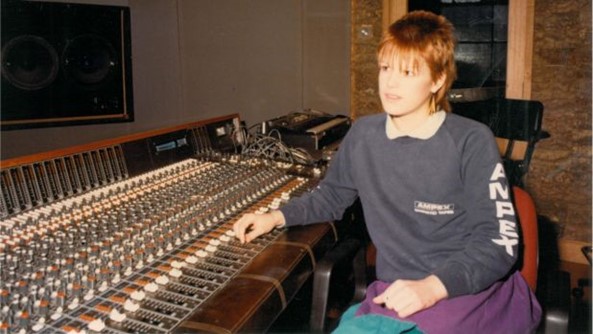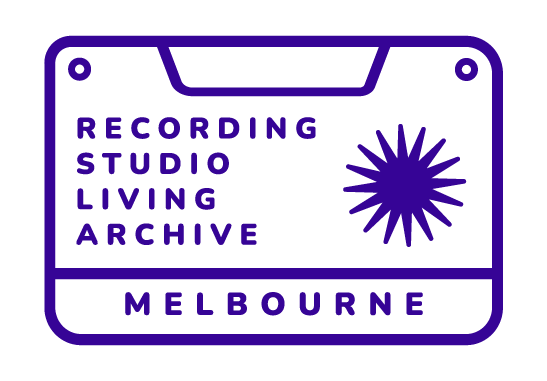When I started out my research into recording studio histories in my home town of Naarm (Melbourne), I didn’t realise I was on a hunt for unicorns until a few interviews in when it hit me. The stark reality that it wasn’t just that I hadn’t asked around enough, it was that there actually were NO women who had managed to endure the industry to the level that they would be credited in a technical role on a popular music recording in Australia pre-2000’s.
I found one, her name is Karen Hewitt.
“Only in hindsight did I realise how alone and ‘unicorn’-like I was starting out. And how much easier it would’ve been to have a gender diverse work environment or a female mentor who had walked the path before me. I look back now at my 16 to 19 -year-olds self and do not wish that another young teenage girl full of hopes and aspirations, to be put through the work environment I encountered.” (Hewitt, ASRA Journal, 2020)

“It was not OK that at the age of 16, I was propositioned to have sex with men who were older than my father and in positions of power in my workplace and/or industry. It was not OK that while I was zeroing the recording desk after a late recording session one evening, the record’s producer joined several microphone cables together, wrapped them around the studio door handle and then around a pillar, making it impossible for me to leave. Expecting to have sex with me in the studio he thought he was doing me a favour, as his ‘cabling’ kills would give us privacy. – (Hewitt, ASRA Journal, 2020)
A resonant theme that has created much noise and change recently in the Australian music industry, is the prevalence of sexual harassment and misconduct women endure in trying to navigate a career in an industry of blurred boundaries and where careers are dependent on healthy networks.
“To this day I walk a fine line between being grateful and disheartened when I think of my start in the music industry as an apprentice engineer. It is impossible to forget the tough situations I had to navigate in my role as the first female trainee in the studio scene in Australia. I know so many women who came years and decades after me and sadly their stories resonate with mine.“ (Hewitt, ASRA Journal, 2020)
of cultural prejudice, lack of opportunity, lack of resources, and most disappointingly, because of traumatic experiences in the workplace. It is a fatigue that kills a woman’s enthusiasm in having to constantly prove her worth, it is navigating the sexual politics and power imbalances of the industry, it is the lack of resources to invest in their own gear and spaces, it is a lack of confidence in women because there are very few role models for them to look up to. Women burn out before they bust through the glass ceiling.
I’m good, but am I that good? 1950’s or now?
If you are told from a young age that you aren’t very good at something (practical & technical for example) that you are actually very interested in, you probably won’t have the confidence to pursue that thing. If society in general, maintains the belief that you aren’t the type of person that could be good at that thing. Even if you do manage to break through the confidence barrier, throughout your career you will continually have your skills scrutinised and questioned. Another person, who is a different sex to you, grows up informed by society that they are good at the thing that you are also interested in. They pursue that interest without hesitance. Noone questions why or assumes they aren’t capable of making a career out of it. The thing that you are both interested in and have learned to be good at requires a certain set of tools. These tools are very expensive. Your natal sex is traditionally not as cashed up as the opposite and you are not in a position to buy equipment. You also don’t quite have the confidence to set up your own business and find some investors. You don’t know anyone from a similar demographic to you in your industry that has done this either. This means to do the thing as a job you either have to hire the gear and space, or work for someone else who in this story, is your competitor and peer. The person mentioned earlier of the opposite natal sex has set up their own space with the latest equipment with help from family. This person is happy for you to hire their space for work and despite being a competitor they are very supportive of your career. You both have the same knowledge and skillset, but you only have access to the equipment on occasion, and it’s not quite affordable enough to use for your own professional development. You will likely never spend as much time, or have as intricate a knowledge of that equipment as the owner that does the same job as you. Both of you know a lot of people in the industry as you have similar networks. Who gets the majority of work out of you or the other person? Who is more likely to be trusted to do a job with a well-known person in the industry? Who is more likely to have the opportunity to work with high profile clients that leverage the reputation of their work? Who eventually develops a reputation as better? Who is more likely to step away from the industry? Who is more likely to be able to develop their skills on an ongoing basis with professional clients?
For a more in-depth critical analysis of women in audio, you can read an article I wrote for the Australiasian Sound Recordings Association (ASRA) 2020 journal here.
